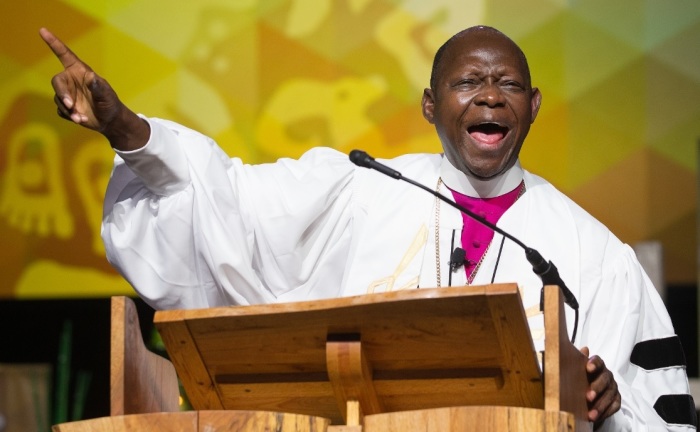African bishop who helped develop UMC separation plan dies in car accident

An African bishop of the United Methodist Church integral to developing the denomination’s separation proposal has died in an automobile accident.
Sierra Leone Area Bishop John K. Yambasu died in a car accident on Sunday while on his way to preach at a funeral for a former district superintendent.
Yambasu died days before his 64th birthday and is survived by his wife, Millicent, and their five children, according to the UMC Council of Bishops.
“Bishop Yambasu’s untimely death is stunning news to The United Methodist Church,” said Council of Bishops President Bishop Cynthia Fierro Harvey. “Bishop Yambasu’s undeniable love and passion for the church has been evident in his area and throughout The United Methodist Church.”
The accident occurred outside of Freetown, Sierra Leone, with onlookers reporting that another driver lost control of their vehicle and crashed into Yambasu, noted UM News on Monday.
The Rev. Kalema Tambwe, dean of district superintendents in East Congo, called him "a humble and intelligent man" who "reminded everyone, every time, of the main mission of the church, which is the transformation of the world and that the church should remain in the middle of the village.”
A native of Sierra Leone, Yambasu graduated from Candler School of Theology in Atlanta, Georgia, and was ordained a deacon in 1987, then an elder in 1990.
Yambasu was elected a UMC bishop in 2008 and was consecrated in 2009. He had taught at many Christian schools and was recently elected chancellor of Africa University.
The Rev. Francis Charley, dean of the Sierra Leone Area cabinet, told UM News that Yambasu provided much-needed leadership during the nation’s Ebola crisis in 2014-2016.
“During Ebola, he led the church and the Inter-Religious Task Force on Ebola. … We went to the length and breadth of this country supporting communities and victims of Ebola,” said Charley.
“During the mudslide also, he provided pivotal leadership for the denomination and the Council of Churches in Sierra Leone where he was president.”
Yambasu played an important part in bringing together theological liberals and conservatives within the UMC to hammer out a proposal for amicable separation over the debate on LGBT issues.
The group Yambasu helped bring together eventually created the “Protocol of Reconciliation and Grace through Separation,” which will be voted at next year’s UMC General Conference.
Among its provisions, the Protocol would allocate $25 million for theologically conservative Methodists to vote to leave the UMC and create their own denomination.
“The United Methodist Church and its members aspire to multiply the Methodist mission in the world by restructuring the Church through respectful and dignified separation,” read the protocol in part, which Yambasu signed along with several other UMC leaders.
“The undersigned agree to use their best efforts to persuade any groups or organizations with which they are affiliated to support the legislation necessary to implement the Protocol.”
The protocol was originally going to be voted on this year. However, the coronavirus pandemic prompted the UMC to delay the General Conference until 2021.
Yambasu was himself a theological conservative, coordinating and signing a statement in 2015 that called on the denomination to maintain its official stance labeling homosexuality sinful and to focus more time on addressing Islamic terrorism.
"For far too long, the voice of the African church has been silent, especially on global issues," said Yambasu at the time to UM News.
"We felt that at a critical moment like this we needed to come out with a voice so that the global church will hear. And then it might provoke more conversation at every level of the church for us to be more intentional as a denomination to facing the realities of the day."



























